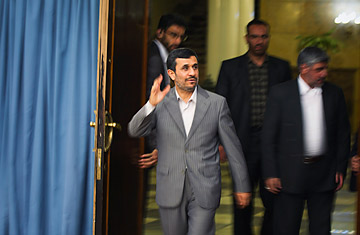
Iranian President Mahmoud Ahmadinejad waves to the media while attending a meeting with Turkish Foreign Minister Ahmet Davutoglu in Tehran on July 11, 2011
The embarrassment just doesn't stop for Mahmoud Ahmadinejad, Iran's beleaguered President. Even before this past weekend, when a third Iranian nuclear scientist was murdered in as many years, gunned down in front of his house in what critics are calling a major security failure, the President's prospects were dimming rapidly. Weakened by a number of bizarre scandals — including allegations that aides used sorcery and invoked jinn on his behalf — humiliated by the arrest of several advisers and isolated from Supreme Leader Ali Khamenei, whose favor once clinched his political future, Ahmadinejad now limps toward the end of his second term, his prospects uncertain. There seems little hope that the President can save himself even with his signature brand of politics, a messianic, nativist-tinged populism that the clerical regime once found handy but has come to consider toxic.
In the West — which cares most of all about Iran's behavior on the nuclear front — Ahmadinejad's reversal of fortune is being regarded by some with schadenfreude for a leader so troublesome. It is also, however, being viewed with concern by others who feel that he is the best hope for a nuclear deal. In reality, the chastening of Ahmadinejad makes virtually no difference to Iran's nuclear stance. Ahmadinejad has used the nuclear issue to stoke nationalist sentiment and increase his popularity at home and in the Muslim world, but in reality the matter has always been in steadier hands. Khamenei has ultimate control over both Iran's long-term nuclear goals and the incremental agreements it feigns interest in at the negotiating table.
If that hasn't always seemed clear from the outside, it's because Iranian domestic politics are often confusing. For years after taking office in 2005, Ahmadinejad turned "Nuclear power is our absolute right" into the slogan of his presidency, defiantly announcing controversial strides in the country's nuclear program at every turn. Then, in 2009, Saeed Jalili, an Ahmadinejad confidante, brokered a breakthrough agreement with the International Atomic Energy Agency to transfer Iran's low-enriched uranium to a third country, prompting some in the West to conclude that Iran was keen to make a larger concession to downsize its uranium stockpile. Esfandiar Rahim-Mashaei, the President's controversial chief of staff, encouraged this speculation with a series of public gestures out of character for the sidekick of an Islamic fundamentalist. He said Iranians were friends to Israelis, spoke of an "Islam without the clerics" and fawned publicly over the country's pre-Islamic past, an era usually derided or denied outright by the clergy.
The President and his cabal, the thinking went, sought a nuclear agreement with the West to shore up their position at home, in the wake of this spring's unprecedented political infighting and with an eye to the 2013 presidential election. With the Iranian economy in a downward spiral and the country restive after Ahmadinejad's contested 2009 re-election, little short of a historic diplomatic breakthrough — the securing of Western approval for Iran's nuclear program — would restore Ahmadinejad's credibility and salvage his presidency. Given the President's existential loathing of the "Great Satan," it's hard to imagine him sincerely laboring toward a new chapter in Iran-U.S. relations. But the prospect inevitably made Iranian conservatives, many of whom oppose the President, seethe. "In Iran," says Ali Ansari, a professor at St. Andrews University in Scotland, "the nuclear issue is tangential to politics, but it's a useful thing to play in relation to other problems."
But while the President's coterie projected a cozier attitude toward the West, it didn't bring that temperament to the negotiating table. Even if that were its desire, it wouldn't have been able to. Khamenei blocked the agreement that Jalili negotiated in 2009, and effectively no progress has been made since. Just this week, Iran said it would try to speed up its uranium-enrichment process — the core issue in its standoff with the West — by installing newer and faster centrifuges at its nuclear plants. That's hardly the sort of announcement that would project a more accommodating posture, if that's what Ahmadinejad is intending.
If anything, recent events seem likely to toughen Ahmadinejad's stance. The country's hard liners are seething after the latest scientist assassination, and Ahmadinejad may well seize the opportunity to endear himself to them by ratcheting up his nationalist rhetoric. If a nuclear deal with the West remains elusive, it would make sense for the President to try another way to rescue his political fortunes from the gutter. "A potential way for him to try to get back in the good graces of Iran's hard-line clerics will be to be even more intransigent on the nuclear issue and more vitriolic toward the United States and Israel," says Karim Sadjadpour of the Carnegie Endowment for Peace.
For the West, this may not be the best news in the short term. But at least it will make the state of play with Iran more transparent. These days, if the country's leadership agrees over anything, it's the importance of serving the West no nuclear concessions.
